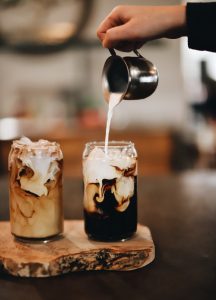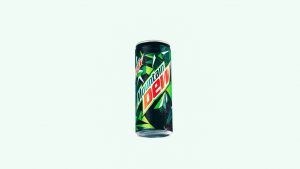
While big companies may have dozens of trademarks, smaller and lesser-known companies can also have valid trademarks, as long as they satisfy the trademark criteria.
Can a large company infringe a smaller company’s mark? Yes! This is sometimes referred to as “reverse confusion,” where the small company is the first user and the large company is the later user. But, there can still be confusion among consumers. The larger company may use its money and resources (like ads) to infiltrate the smaller company’s market with a similar mark on similar goods or services.
This may seem theoretical, but it’s not. Take the case of Rise Brewing Company v. PepsiCo, Inc for instance. Rise Brewing Company is a small-business nitro cold brew coffee company that has sold Rise canned cold-brew coffee since 2014. Soda giant PepsiCo named and marketed one of their Mountain Dew energy drink products, “Mtn Dew Rise” in March of 2021. Thinking there might be consumer confusion and a threat to their business, Rise Brewing Company sued PepsiCo in a trademark infringement action.
Were they victorious? Yes! Fortunately for Rise Brewing Company, U.S. District Judge Lorna G. Schofield of the Southern District of New York entered a ruling for a preliminary injunction against PepsiCo, stopping them from using the mark “RISE” in association with its soft drinks.
Let me explain why the Court correctly ruled. We’ll first start by explaining what a trademark (™) is.
Any Company CAN Have a TM
A trademark is a word, phrase, symbol, design, smell, taste, sound, or a combination of these things that work to identify a company’s goods or services. For example, Rise Brewing Company’s trademark is the word “RISE”. The company uses it to refer to their organic, canned coffee beverage. Trademarks can help build brand recognition through public perception of the company, create customer loyalty, and develop the company’s reputation by promoting the company to investors.
What rights does a TM grant? Basically, it allows its owner to prevent others from using a similar or same mark on goods or services if there is likely confusion among consumers and the trademark is being used in commerce.
When a large company like PepsiCo launched its new canned caffeine drink with the identical product name, “RISE,” Rise Brewing Company filed suit for trademark infringement. Trademark infringement occurs when another entity uses a trademark without authorization on or in connection with goods or services in a way that causes confusion about the source (origin) or sponsorship (affliation) of the goods or services.
Fizzled Out: Pepsi Cannot Use ‘Rise’ for Their Mtn Dew ‘Rise’
In Rise Brewing Company’s complaint, they alleged PepsiCo’s use of the RISE mark on their new product will create confusion among consumers as to the source of the parties’ respective products. In other words, the claim is about so-called sponsorship confusion. This means people might think that Pepsi sponsored the Rise coffee because Pepsi is the larger and more well-known company. In their answer, PepsiCo argues that its “Mtn Dew Rise” was a morning caffeine drink that was fruit-flavored and not a coffee drink, such that consumers would not be confused.

To analyze whether PepsiCo may be liable for reverse confusion, one must look to the relevant confusion factors for sponsorship confusion: strength of the mark, similarity of mark, and actual consumer confusion if it’s present.
Strength of Rise Brewing Company’s mark “RISE”:
The strength of the trademark “refers to the distinctiveness of the mark, or more precisely, its tendency to identify the good sold under the mark as emanating from a particular… source.” McGregor-Doniger, Inc. v. Drizzle, Inc., 599 F. 2d 1126, 1131 (2d Cir. 1979). As the Judge Schofield noted, “RISE” is a suggestive mark because “it evokes images of morning”. A suggestive mark means it requires consumers, specifically the morning coffee drinker in this case, to use their imagination to associate the mark “RISE” with their nitro cold-brew coffee. While suggestive marks can be inherently distinctive, Judge Schofield also looked to market distinctiveness because “suggestive marks are not necessarily distinct in the marketplace.” Two Hands IP LLC, 2021 WL 4437975 at 7.
Market distinctiveness can be analyzed through six factors according to Car-Freshner Corp v. American Covers, LLC: “advertising expenditures, consumer studies linking the mark to a source, unsolicited medica coverage of the product, sales success, attempts to plagiarize the mark, and the length and exclusivity of the mark’s use.” Judge Schofield reasoned that these factors leaned slightly in favor of Rise Brewing Company. First, Rise Brewing Company spent $17.5 million in promoting its “RISE” marks. It received awards for its products, and it was exclusively using the mark “RISE” for its canned caffeinated beverage before Pepsico’s Mtn Dew Rise launched. While Rise Brewing Company did not provide any consumer studies or evidence as to Pepsico’s attempts to plagiarize its marks, the Judge mentioned that the style of the mark “RISE” with its unique form and shape of the letters were taken by Pepsico. Thus, this first factor slightly favored Rise Brewing Company.
Similarity of mark “RISE”:
To access similarity of the marks, “courts look to the overall impression created by the logos and the context in which they are found and consider the totality of factors that could cause confusion among prospective purchasers.” Gruner + Jahr USA Publ’g, a Div. of Gruner + Jahr Printing & Publ’g Co. v. Meredith Corp., 991 F.2d at 1078. Here, Judge Schofield observed that the appearance of the mark “RISE” is highlighted similarly on both Rise Brewing Company’s and PepsiCo’s cans in bold, bright color, all capital lettering. She mentioned how both parties have the mark “RISE” printed against a light background and how the mark “is the dominant feature occupying the top third of the can.” Judge Schofield determined this second factor favored Rise Brewing Company.
Actual consumer confusion: Rise Brewing Company presented three separate testimonies regarding examples of actual confusion present. Judge Schofield declared this as another factor for Rise Brewing Company.
Overall, PepsiCo seems to have infringed Rise Brewing Company’s “RISE” trademark per Judge Schofield’s reasoning “given the degree of similarity between Plaintiff’s and Defendant’s marks, the proximity of their areas of commerce, and credible testimony of actual confusion.” In the end, Judge Schofield held that Rise Brewing Company showed that the risk of reverse confusion was probable and issued an injunction on PepsiCo.
Ahh caffeine, a craze in the coffee house, grocery store, and even the courtroom.

Suet Lee
Associate Blogger
Loyola University Chicago School of Law, JD 2023